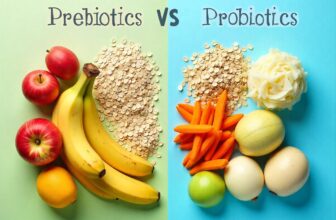
Did you know that your gut houses trillions of microorganisms that influence everything from your mood to your immune system? 🦠 Yet, an estimated 70 million people suffer from digestive problems, often without realizing that the solution lies in natural gut health improvement.
Your gut is like a bustling city with its own ecosystem, and when this delicate balance is disrupted, it can lead to bloating, fatigue, skin issues, and even anxiety. The good news? You don’t need expensive treatments or complicated medical procedures to restore your gut health. By making simple, natural adjustments to your daily routine, you can transform your digestive wellness and overall health.
In this guide, we’ll explore five essential aspects of natural gut health improvement – from understanding your microbiome to implementing daily digestive practices. You’ll discover practical, science-backed strategies that you can start using today to build a healthier gut ecosystem. Let’s dive into the fascinating world of gut health and learn how to nurture your internal garden. 🌿
Understanding Your Gut Microbiome
Your gut microbiome hosts trillions of bacteria performing vital functions like nutrient absorption, immune system regulation, and neurotransmitter production. These microscopic allies help break down food, protect against harmful pathogens, and maintain the integrity of your intestinal barrier.
Common signs of gut imbalance include bloating, irregular bowel movements, skin issues, and mood changes. The gut-brain connection means your microbiome influences everything from mental health to weight management. Poor gut health can lead to inflammation, reduced nutrient absorption, and weakened immunity.
- Key Functions:
- Nutrient breakdown
- Immune defense
- Hormone regulation
- Barrier protection
| Healthy Gut Signs | Unhealthy Gut Signs |
|---|---|
| Regular digestion | Bloating |
| Stable mood | Anxiety |
| Clear skin | Breakouts |
| Consistent energy | Fatigue |
Dietary Changes for Better Gut Health
Transforming your gut health starts with mindful eating. Focus on incorporating fiber-rich foods like leafy greens, whole grains, and legumes, which act as natural digestive aids. Fermented foods such as kimchi, sauerkraut, and yogurt introduce beneficial probiotics, while prebiotic-rich foods like garlic, onions, and bananas nourish existing gut bacteria.
| Food Category | Include | Avoid |
|---|---|---|
| Fiber Sources | Oats, Quinoa, Berries | White Bread, Processed Grains |
| Probiotics | Kefir, Kombucha, Miso | Shelf-stable Yogurt |
| Prebiotics | Asparagus, Leeks, Apples | Artificial Sweeteners |
| General Foods | Lean Proteins, Healthy Fats | Processed Foods, Added Sugars |
Lifestyle Habits That Impact Gut Health
Stress Management Techniques
Regular meditation and deep breathing exercises can significantly reduce cortisol levels, which directly affects gut health. Practice mindfulness for 10-15 minutes daily, try progressive muscle relaxation, or engage in gentle yoga to maintain a balanced gut-brain connection.
Sleep Quality Importance & Regular Exercise Benefits
Quality sleep of 7-9 hours promotes healthy gut bacteria growth, while consistent physical activity enhances digestive function. Aim for 30 minutes of moderate exercise daily, combining cardio and strength training to stimulate beneficial gut microbe diversity.
- Key lifestyle practices:
- Daily meditation or mindfulness
- Regular sleep schedule
- Moderate exercise routine
- Stress-reducing activities
| Activity | Recommended Duration | Gut Health Benefits |
|---|---|---|
| Meditation | 10-15 mins/day | Reduces inflammation |
| Sleep | 7-9 hours/night | Promotes microbiome balance |
| Exercise | 30 mins/day | Increases bacterial diversity |
Natural Supplements and Remedies
Beneficial Herbs and Spices
- Turmeric – reduces inflammation
- Ginger – aids digestion
- Peppermint – soothes digestive discomfort
- Cinnamon – regulates blood sugar
- Oregano – natural antimicrobial
Natural supplements play a crucial role in maintaining optimal gut health. Incorporating healing herbs and spices into your daily routine can significantly reduce inflammation and support digestive function. These natural remedies have been used for centuries in traditional medicine and are now backed by modern research.
Probiotic supplements and digestive enzymes work synergistically to enhance nutrient absorption and maintain healthy gut flora. When combined with fermented foods like apple cider vinegar and mineral-rich bone broth, these supplements create a powerful foundation for gut healing. These choices help restore balance to your digestive system naturally.
Daily Practices for Optimal Digestion
Proper Eating Habits and Meal Timing
Mindful eating practices, such as chewing thoroughly and eating without distractions, significantly enhance digestion and nutrient absorption. Aim to eat your meals at consistent times daily, with a 12-hour fasting window overnight to support gut microbiome recovery and digestive rest.
Hydration Guidelines
Maintaining proper hydration is crucial for digestive health, with a recommended intake of 8-10 glasses of water daily. Drink water between meals rather than during them to optimize digestive enzyme function. Consider starting your day with warm lemon water to stimulate digestive processes.
Key Hydration Tips:
- Drink water 30 minutes before meals
- Avoid ice-cold beverages during meals
- Limit fluid intake during meals
- Consume herbal teas between meals
| Meal Timing | Recommended Practice |
|---|---|
| Breakfast | Within 1 hour of waking |
| Dinner | 3 hours before bed |
| Between Meals | 3-4 hour gaps |
Nurturing your gut health is a comprehensive journey that combines mindful eating, lifestyle modifications, and daily wellness practices. From incorporating diverse, fiber-rich foods to maintaining consistent sleep patterns and managing stress levels, each step plays a vital role in building a robust digestive system.
Take the first step today by introducing one positive change to your routine, whether it’s adding fermented foods to your diet or establishing a regular meal schedule. Remember, small, consistent actions lead to significant improvements in your gut health, which ultimately enhances your overall well-being and quality of life.






